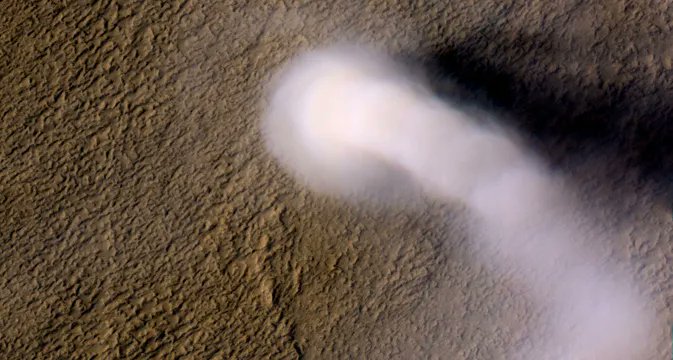Dust is an everyday feature on Mars and wreaks havoc on various pieces of equipment humans decide to send to it, such as Insight’s continual loss of power or the losses of Opportunity and Spirit. But we’ve never really understood what causes the dust to get up into the air in the first place. That equipment that is so affected by it usually isn’t set up to monitor it, or if it is, it has been sent to a place where there isn’t much dust, to begin with. Now, that has changed with new readings from Perseverance in Jerezo crater, and the answer shouldn’t be much of a surprise – dust devils seem to cause some of the dust in the atmosphere on Mars. But strong winds contribute a significant amount too.
A new paper in Science Advances by a team of over 45 scientists reports on data collected by Perseverance’s instrumentation that is designed to study the Martian environment. The Radiation and Dust Sensor (RDS) instrumentation is part of a broader package of instrumentation known as the Mars Environment Dynamics Analyzer (MEDA).
This instrument can detect changes in the environmental conditions that would occur around the rover about once a second. The most likely cause of those changes would be the presence of dust devils.
But it is not enough to detect those changes alone, as they could be caused by sources other than dust devils. So the RDS combines forces with another MEDA instrument, the Thermal InfraRed Sensor (TIRS), which can provide data on the tracking radiative flux around the rover. Combining these two data sets allow scientists to comprehensively say whether or not a dust devil has overtaken the rover.
They do so often. About four times a day, the rover is subjected to “convective vortices,” the technical term for updrafts that are strong enough to sense. About one of those four carries enough dust to be thought of as what we would conventionally call a “dust devil.” And their existence seems to be the source of most of the dust that reaches the air. But they aren’t the only source.
There was some evidence for strong wind gusts that don’t actually form into a dust devil and might force a significant amount of dust into the air themselves. While these weren’t necessarily as strong as the dust devils, they covered a much larger area, with the largest being ten times larger than the largest dust devil. So even if they are much weaker, they were potentially able to lift smaller grains of dust high into the atmosphere.

Credit – NASA / JPL / UArizona
The scientists think that a roughly equal amount of dust in the Martian atmosphere could be caused by both dust devils and these more concentrated wind gusts. But no matter what the dust is from, the existence of instruments on Mars that can finally collect data on the underlying cause of the dust is a breakthrough in understanding the Martian environment. It might also help us find a way to disrupt this potentially destructive process if it ever comes to that.
Learn More:
Newman et al – The dynamic atmospheric and aeolian environment of Jezero crater, Mars
UT – Dust Storms on Mars Happen When the Planet Can’t Release its Heat Fast Enough
UT – Amazing View of How Dust Storms Grow on Mars
UT – A Single Dust Devil on Mars
Lead Image:
Massive dust devil on Mars.
Credit – HiRISE, MRO, LPL (U. Arizona), NASA

